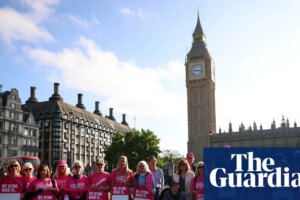
The EHRC closed a consultation on proposed changes to statutory guidance last month, following the Supreme Court ruling in April that “sex” in the Equality Act 2010 refers to biological sex, and a Gender Recognition Certificate does not change a person’s sex for the purposes of the act.
An interim update from the EHRC, published in May, said that “trans women (biological men) should not be permitted to use the women’s facilities and trans men (biological women) should not be permitted to use the men’s facilities, as this will mean that they are no longer single-sex facilities”.
READ MORE:
Responding to the consultation, Museums Galleries Scotland (MGS), which supports around 455 non-national museums and is funded by the Scottish Government, said EHRC’s proposals may “force some museums to close”, or “risk leaving trans people with no facilities at all” if changes could not be made.
It urged the UK-wide watchdog to “understand the impacts and needs of trans individuals and organisations committed to trans inclusion”.
The consultation response from MGS said: “We have concerns that the content and process of the EHRC Code of Practice does not uphold the spirit of inclusion.
“There is no guidance on how to include trans people, there is only information on how to exclude them. This has not made sufficient effort to offer advice to organisations who wish to remain or become trans inclusive.”
It warned that due to “lack of clarity” from EHRC, “there is a significant potential that human rights of trans people will be impacted for example, being banned from toilets that align with lived gender”, and also raised concerns about the responsibilities of front-of-house staff.
The response said: “When there is a need to ‘prove’ your sex, what proof will be acceptable given gender recognition certificates are not, nor are altered birth certificates. It is likely this role would fall on front-of-house staff, which we believe puts undue pressure on them.”
It added: “To avoid discrimination, it would require every person using toilets to be checked, adding substantial workload and staff costs.
“The guidance implies that to allow trans people to use toilets that fit their identity would put organisations at risk of legal consequences. Yet, to not check everyone could lead to individuals in museums taking decisions to exclude trans people based on subjective tests, related largely to appearance.”
It warned this could “potentially put trans and non-trans people in humiliating and offensive situations”, and that some museums may be forced to close “while they invest time and resources to ensure adequate facilities”, and if changes could not be made “this risks trans people having no facilities to use at all”.
The response said it was aware of the public “policing toilets at heritage sites by making assumptions based on stereotypes”, and said this created an “environment of suspicion and policing of everyone’s gender presentation, and increases the risks of harassment, distress, and offence”.
It added: “For some museums, they may need to change their toilet facilities to avoid the higher risk of legal consequences, however, there is unlikely to be capacity or resource for many of them to do this, putting them in a difficult position.”
The response concluded: “We strongly encourage the EHRC to review their processes around this guidance and take the necessary time to understand the impacts and needs of trans individuals and organisations committed to trans inclusion.”
Scottish Conservative shadow equalities minister Tess White MSP said: “Museums Scotland seem to be following the Scottish Government in their mistaken bid to avoid implementing the Supreme Court’s verdict. The judgment from the UK’s highest court was crystal clear.
“By criticising the EHRC’s guidance, Museums Scotland are flouting the law, putting women and girls in danger and laying themselves open to legal challenge. There is no excuse for evasion on this issue.
“Instead of trying to pander to the gender extremists, John Swinney must act now and order all public bodies immediately to comply with the law and provide single-sex spaces.”
A spokesperson for analysts MurrayBlackburnMackenzie said: “It is deeply concerning that a major national institution signed off and submitted such an ill-informed response to the EHRC consultation. The response fails to consider the needs of women and instead repeats trans activist talking points.”
PA reported that the Scottish Government, EHRC and Sex Matters have been contacted for comment.





